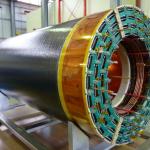Bringing micro-pattern technologies closer to the main users
The CERN PCB workshop located in Bldg. 102, previously part of TE, has become since January 2014 a facility of the PH department. The facility produces mainly ceramic hybrids, low-mass circuits, fine-pitch readout boards, PCBs (FR4, kapton, flex-rigid) and detector components. The workshop is playing in particular a key role in the development of components for micro-pattern gas detectors (MPGD) and MPGD assembly techniques, an activity that has been growing very significantly in the last few years.
MPGD technologies are being proposed to replace or complement some of the LHC tracking or muon detector systems. These projects will shortly enter into a production phase, where thousands of m2 of detector components will have to be manufactured, accepted, assembled and tested. The engineering aspects of large size detector construction and integration should run together with a focused, parallel R&D programme to ensure stable and reliable operation of large MPGD systems. Building on the core expertise of the workshop (production of high quality and highly specialized detector components) and PH-DT (Detector R&D, construction, integration and operation knowledge), the role of the PH-DT group as an open center of expertise for detector prototyping and development is being strengthened.
The main motivation behind transferring the workshop from the TE Department to the PH department is therefore to integrate it more directly with its largest user community. This will provide the experimental detector community with new opportunities and possibilities, and the workshop can also more directly participate in projects in this area.
The facility is run by a team of 20 persons (staff and FSU) led by Rui de Oliveria.




